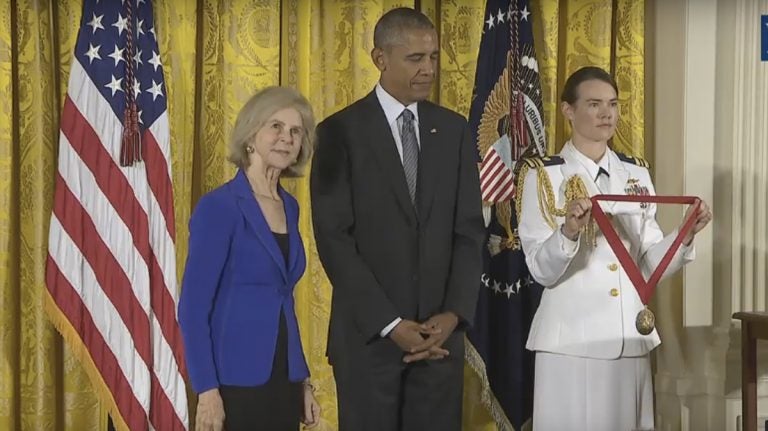Princeton University’s Elaine Pagels to be honored at the White House

Elaine Pagels (left) about to receive a National Humanities Medal from President Obama (center) (Image from WhiteHouse.gov)
(Updated with video of the entire ceremony. To see Elaine receiving the award fastforward to 26:21)
Divine beings, visions, revelations and apocalypses, angels and resurrection—the Bible is filled with such fantastical elements. What does it all mean today?
Princeton University Professor of Religion, historian and best-selling author Elaine Pagels has made it her life’s work to investigate ancient religious manuscripts and their contemporary meaning, and will be receiving a 2015 National Humanities Medal for her exploration of faith and its traditions during a White House ceremony on Thursday, September 22, 2016.
President Obama will present the award and First Lady Michelle Obama will attend the ceremony, which will stream live at WH.gov/live. “I’m amazed and delighted, and especially honored to meet and thank THIS president, who has restored honor and integrity to our country,” said Dr. Pagels, reached enroute to Washington, D.C.
“Through her study of ancient manuscripts and other scholarly work, [Elaine Pagels] has generated new interest and dialogue about our contemporary search for knowledge and meaning,” says the award citation.
The medal honors an individual or organization whose work has deepened the nation’s understanding of the human experience, broadened citizens’ engagement with history and literature, or helped preserve and expand Americans’ access to cultural resources.
The 12 awardees include a poet, physician, chef and a higher education program, and includes WHYY’s Terry Gross, host of Fresh Air, for her “artful probing of the human experience, revealing simple truths that affirm our common humanity”; and Lambertville, N.J., based author and musician James McBride, for “humanizing the complexities of discussing race in America.”
In a statement on the Princeton University website, President Christopher L. Eisgruber remarked “Through path-breaking research and dedicated teaching, Elaine Pagels has enlivened the study of religion and helped to shed light on the development of Christianity and Gnosticism over many centuries.”
Eisgruber described Pagels as “a gifted writer, scholar and teacher” who has “mentored students at all levels—from brand-new undergraduates in her freshman seminar to the most advanced graduate scholars.”
A question Pagels, 73, is often asked is whether she is religious. She does not easily embrace the virgin birth and the physical resurrection of Jesus as literal events but says the music, liturgy and prayers speak to her, whether in an Episcopal church, a Buddhist meditation group or a Passover Seder. She was raised in a non-practicing Protestant family to believe religion would become obsolete in a world of scientific rationalists—her father was a plant biologist at Stanford University. Speaking on WHYY’s Radio Times in 2012, Pagels said when was 13 she joined an evangelical group because she loved the intensity and passion, but left after a year when fellow evangelicals claimed a Jewish friend who died in a car crash would go to hell.
After a brief flirtation with becoming a dancer—she studied with the Martha Graham Company—Pagels earned a bachelor’s in history and master’s in classics from Stanford University and a Ph.D. in religion from Harvard, where she learned Coptic, a northern Afroasiatic language spoken in Egypt until the 17th century. Pagels was a professor and chair of the Department of Religion at Barnard College, and an associate professor at Columbia University before receiving a MacArthur Fellowship. She joined the Princeton faculty in 1982.
Pagel’s own life became a kind of hell when, in 1987, her 6-year-old son died (he had pulmonary hypertension since infancy), and soon after she lost her husband, the physicist Heinz Pagels, in a climbing accident. She found herself a single mother with the two adopted children and took solace in writing ”Beyond Belief: The Secret Gospel of Thomas.” That book, which went on to become a best-seller, examines the Gospel of Thomas, written around 100 C.E., which was discovered buried in a jar in Egypt in 1945 with other early Christian writings.
In 1995 Pagels married R. Kent Greenawalt, a professor at Columbia Law School, blending their five children.
“I study religion because I find it fascinating and problematic,” she told The New York Times in 2004. “But I struggle with the idea of what religion is, what being religious means. A lot of people assume that if you write about early Christianity, you must be some kind of Sunday-school teacher.”
Her writings are nothing at all like what is taught in Sunday School. “Gnostic Gospels,” an examination of the early Christian religious movement called Gnosticism, won the National Book Award and the National Book Critics Circle Award and was selected by the Modern Library as one of the best 100 English-language nonfiction books of the 20th century. It looks at how gnosticism—which embraces the spiritual world and enlightenment through philanthropy, abstinence, poverty and other forms of privation—combines the teachings of Jesus Christ with Eastern traditions, such as Buddhism.
She also wrote “The Origin of Satan: How Christians Demonized Jews, Pagans, and Heretics,” in which she argues that Satan, not evil in the original Hebrew Bible, was made evil in the Christian Bible as a way to demonize adversaries; and “Adam and Eve and the Serpeant : Sex and Politics in Early Christianity,” in which she makes the case that traditional Christian attitudes toward sexuality emphasizing abstinence were not part of its origins.
Her newest book, “Revelations: Visions, Prophecy and Politics in the Book of Revelation,” explores the New Testament Book of Revelation and other Jewish, Christian and pagan books of Revelation written around the same time.
______________________________________________________________
The Artful Blogger is written by Ilene Dube and offers a look inside the art world of the greater Princeton area. Ilene Dube is an award-winning arts writer and editor, as well as an artist, curator and activist for the arts.
WHYY is your source for fact-based, in-depth journalism and information. As a nonprofit organization, we rely on financial support from readers like you. Please give today.





